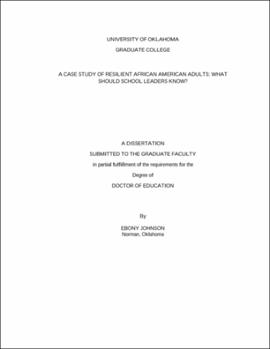| dc.contributor.advisor | Adams, Curt | |
| dc.creator | Johnson, Ebony Joy | |
| dc.date.accessioned | 2019-04-27T21:29:43Z | |
| dc.date.available | 2019-04-27T21:29:43Z | |
| dc.date.issued | 2011 | |
| dc.identifier | 99237934902042 | |
| dc.identifier.uri | https://hdl.handle.net/11244/318830 | |
| dc.description.abstract | Through a qualitative, case-study, the extensive literature regarding resilience and the historical information regarding the city in which the participants resided rendered the following five factors that constitute the protective factors for the study: societal and socioeconomic factors such as supportive adults at home, at school, and in the community; rigorous and challenging educational experiences that meet the academic, social and cultural needs of the child; opportunities for continuous engagement and focus through extracurricular after-school, Saturday, and summer enrichment programs; a network of achieving peers; and a strong belief in and sense of oneself. The ways in which these protective factors relate to sources of efficacy information were identified and analyzed. | |
| dc.format.extent | 138 pages | |
| dc.format.medium | application.pdf | |
| dc.language | en_US | |
| dc.relation.requires | Adobe Acrobat Reader | |
| dc.subject | Resilience (Personality trait) in adolescence | |
| dc.subject | African Americans--Education | |
| dc.subject | Educational anthropology--United States | |
| dc.title | A Case Study of Resilient African American Adults | |
| dc.type | text | |
| dc.type | document | |
| dc.thesis.degree | Ed.D. | |
| ou.group | Jeannine Rainbolt College of Education::Department of Educational Leadership and Policy Studies | |
